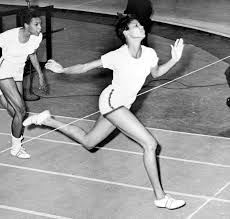 Wilma RudolphWikimedia Commons“The Tornado,” “The Black Gazelle,” “Skeeter,” “The Black Pearl,” also known as Wilma Rudolph, who conquered the inevitable and overcame obstacles that no person should have to go through. Being born the fifth of eleven children at just four and a half pounds, in 1940, in the small town of Saint Bethlehem, Clarksville, Tenessee, led Rudolph to a life no one would have expected for her. With how small she was when she was born, her mom was already worried for her well being, but little did she know little Wilma Rudolph’s life would get a whole lot harder.
Wilma RudolphWikimedia Commons“The Tornado,” “The Black Gazelle,” “Skeeter,” “The Black Pearl,” also known as Wilma Rudolph, who conquered the inevitable and overcame obstacles that no person should have to go through. Being born the fifth of eleven children at just four and a half pounds, in 1940, in the small town of Saint Bethlehem, Clarksville, Tenessee, led Rudolph to a life no one would have expected for her. With how small she was when she was born, her mom was already worried for her well being, but little did she know little Wilma Rudolph’s life would get a whole lot harder.
At the age of six, she came down with pneumonia, scarlet fever, and polio, which led to infantile paralysis. She lost all use of her left leg and was told she would never be able to walk again. Wilma said, “My doctors told me I would never walk again. My mother told me I would. I believed my mother” (Norwood). Wilma believed that she would once be able to walk again with a lot of hard work. A Nashville specialist told Wilma and her family that massaging her legs multiple times a day might help her gain control and feeling back. So her brothers and sisters all helped during the day to massage young Wilmas leg's.
"'By the time I was 12,' she told the Chicago Tribune, 'I was challenging every boy in our neighborhood at running, jumping, everything'" (Gale Research). Her mom was, in fact, right: Wilma not only was able to walk again, but in only six years she was able to run and jump and challenge everyone around her. Wilma had worked so hard to get where she was, and she would continue to work hard for the rest of her life. She enjoyed playing sports, being outside and doing anything active that she possibly could.
“Rudolph desperately wanted to play high school basketball, but she simply could not convince the coach to put her on the team. When she finally worked up the nerve to ask him for a tryout, he agreed to coach her privately for ten minutes each morning. Still, she was cut in her freshman year” (Gale Research). She work hard for things, but she still got turned down even with all of her effort. She continued to work so hard in all aspects and practiced and soon became a star athlete at her high school in her small town of Tennessee. All of her hard work ended up paying off: “As a sophomore she scored 803 points in twenty-five games, a new state record for a player on a girls' basketball team” (Wilma Rudolph Biography). Without the hard work of her and her family, she would have never been the successful athlete she was.
She competed in the 1956 Olympics at the age of 16, not even being out of high school yet. At the games in Melbourne, Australia, she won a bronze medal in the 4 x 100-meter relay race. After not being happy enough with this accomplishment, she went back home and worked even harder so she could come back and compete in the next Olympics. In the 1960 Olympics, she did an outstanding job; she became the first American athlete to win three gold medals in one single Olympics. This alone had such an impact on so many different groups of people: She not only was the first American athlete but she was African American as well, making this even more of a big deal. At the time of her retirement, Rudolph was still the world record-holder in the 100-meter, 200-meter, and 4 x 100-meter relay events.
Wilma Rudolph is a sports icon for African Americans, women and people with disabilities. She even went on after her career to coach young athletes who were less fortunate. She impacted so many people and overcame so many obstacles throughout her life and did it all with a humble heart. We look up to heroes like Rudolph. She changed the game for so many people that thought they could never do things. She was a living example of someone who overcame the impossible. Being told she would never walk again to breaking world records, winning gold medals and impacting the entire world. Sadly in 1994, Wilma lost her final battle to brain cancer, but her life nonetheless was remarkable. Wilma Rudolph was more than an athlete, simply, a hero.
Page created on 11/22/2019 8:53:53 PM
Last edited 9/3/2021 5:17:58 AM
Engel, Keri. Wilma Rudolph, Olympic gold medalist & civil rights pioneer. [Online] Available https://amazingwomeninhistory.com/wilma-rudolph-olympic-gold-medalist-civil-right-pioneer/.
of World Biography, Encyclopedia. https://www.notablebiographies.com/Ro-Sc/Rudolph-Wilma.html. [Online] Available Wilma Rudolph Biography.
Norwood, Arlisha R.. Wilma Rudolph. [Online] Available https://www.womenshistory.org/education-resources/biographies/wilma-rudolph.
